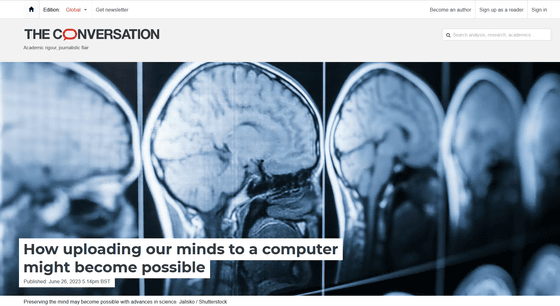How far has research into uploading people's minds to computers progressed?

Since our 'mind' can be said to be a phenomenon produced by information processed in the brain, research has been conducted for a long time whether the mind can be processed or reproduced by a computer. Angela Thornton, a PhD Candidate at the University of Nottingham, explains the idea of 'separating the mind from the body and uploading it to the computer'.
How uploading our minds to a computer might become possible
https://theconversation.com/how-uploading-our-minds-to-a-computer-might-become-possible-206804

A television program broadcast in 2016 featured the 2045 Initiative , which was founded by Dmitry Itskov, who runs several media companies in Russia. The 2045 Initiative is a non-profit organization established for the purpose of ``developing technology that transfers an individual's personality to a more advanced non-biological body and realizes immortality''. Itzkov predicted that by 2045 the technology that would enable immortality would be established.
The 2045 Initiative aims to “connect the brain and the computer so that they can exchange information,” “connect the brain to a life support system and allow it to interact with the environment,” and “emulate the human personality.” We have set goals such as 'transplanting a personality into an avatar equipped with an artificial brain that can rate', but neither technology has been realized at the time of writing the article.
However, what kind of structure and how the human brain functions is being elucidated little by little, and human beings are gradually moving toward the realization of 'whole brain emulation' that completely reproduces the human brain. says Thornton.

The most promising technology for realizing whole-brain emulation is 'scan and copy'. This is to scan the stored brain structure in detail with an electron microscope etc. and collect the data necessary to create a brain with exactly the same structure. In 2008, a research team at the University of Oxford commented on the feasibility of whole-brain emulation made possible by these technologies, saying, ``Although it is a very difficult engineering and research task, there is no clear goal. It has been set and seems to be achievable if current technology advances, ” (PDF file) has been announced .
In recent years, the term 'neurotechnology' has been coined, and brain-machine interfaces have emerged, in which devices that connect to computers are embedded in the brain. For example, Elon Musk, CEO of Tesla and SpaceX, has launched the brain implant company `` Neuralink '', which has been approved for human clinical trials in May 2023.
Why did Earon Mask's brain implant company 'Neuralink' take a long time to receive approval for human clinical trials? -GIGAZINE

In addition, with the development of such brain-machine interface technology, cases have been reported in which severe paralysis patients were able to operate PCs and smartphones just by thinking, shopping and sending e-mails. increase.
What is 'Synchron', a startup that inserts brain implants from blood vessels and allows disabled people to use cursors and devices? -GIGAZINE

Furthermore, with the advancement of AI technology, it is becoming possible to decode brain waves read by devices. ``In the future, it may be possible to write and modify the brain,'' Thornton said.
However, with the increasing technological possibilities, ethical and legal issues have arisen in the study of the brain and mind. The term ' neurolights ', which means human rights and rights to the cranial nerves, has also appeared, and there is a movement to develop guidelines and laws to protect the contents of the brain, which was previously considered inaccessible.
In addition, there are many skeptical opinions about the possibility of whole brain emulation. Whole-brain emulation mind uploading is based on the assumption that the mind is the result of information processing by the brain, but our minds, especially consciousness, are far more ephemeral than biological brain functions. Mr. Thornton points out that there are many people who think that it is a thing.
``No one knows how long it will take to emulate the human brain,'' Thornton said. It may seem like a lifetime away, but we have to think about how fast technology has advanced over the past decade.'
Related Posts:
in Science, Posted by log1i_yk






